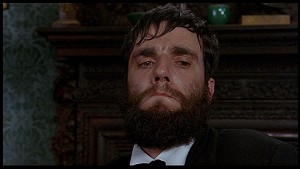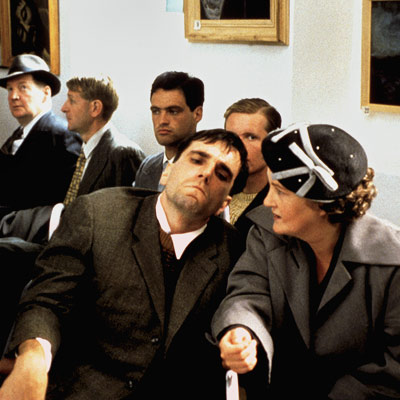Lewis has portrayed a variety of characters in his career that have showcased his acting abilities -- ranging from oil tycoons, 19th century mob bosses, to wrongly accused Irish activists -- but never has a portrayal showcased his abilities more than his performance of the cerebral palsy-afflicted Christy Brown.
My Left Foot, directed by Jim Sheridan, tells the story of Christy, based on his own autobiography of the same name, which was adapted to the screen by Shane Connaughton and Sheridan. The fact that the Christy was able to tell his own story is a triumph in itself. Christy, who suffers from Cerebral Palsy, had one controllable limb -- his left foot. With that foot, he taught himself how to write and paint, and not only write and paint well enough for a man with one foot, but well enough to become an actual artist.
A lot of My Left Foot deals with ignorance in the early 20th century. The biopic begins at the very beginning of Christy's life, at birth in Dublin, Ireland. Right away, doctors know that something is wrong with him, and shortly thereafter, he is diagnosed with Cerebral Palsy, a condition that affects motor abilities. The term "Cerebral Palsy" is a vague, and the symptoms of those who have it range extravagantly on a case-by-case basis. But so little is known about the condition that Christy is simply dismissed as a "cripple." In a blue-collar Ireland town, where families depend on hard work and labor to get by, it was almost considered shameful to have such a child.
That notion is evidenced by Christy's father, Paddy, (Roy McAnally), a man with a lot of pride but very little to show for it, who all but disregards Christy as his son at his young age. But Christy's mother, Bridget, played excellently by Brenda Flicker, certainly doesn't disregard. She gives him all the motherly nurturing and care that anybody could ask for, and never once questions why one of her children has to suffer. Christy is one of five children, having two sisters (Alison Whelan and Kirtsen Sheridan) and two brothers (Declan Croghan and Eanna MacLiam), none of whom are disabled.
 |
| Daniel Day Lewis as Christy Brown in My Left Foot. |
The first scene involves Christy at home alone with Bridget. After hearing a loud noise, Christy crawls over to the top of the stairs to see what happened, and witnesses Bridget lying motionless at the bottom of the stairs. Using all the strength he could muster, he heroically topples down the stairs, and slams his left foot into the front door until he attracts attention from the neighbors, thus saving his mother's life.
The second scene, almost immediately after, shows the Brown family circled around the table, with the children working on their homework. One of Christy's brothers asks aloud, "What is 25 percent of a quarter?" No one else in the family knows the answer, and Paddy goes as far as saying, that "That's a stupid question. Twenty-five percent is a quarter. You can't divide a quarter of a quarter." Hearing this, Christy grasps a piece of chalk between his left toes, and begins to write something on the floor. His family watches as he struggles to writes something, but it's so sloppy that they shrug it off as gibberish. However, the viewer can tell that what he wrote is the fraction "1/16," thus answering the question and indicating that he is not only smart -- but the smartest one in his whole family.
The movie intertwines time in Christy's life. Every now and then we cut to "the present," which shows an elder Christy at a banquet, accompanied by a woman named Mary (Ruth McCabe.) Christy makes many attempts to court Mary, who actually happens to be reading his book. Christy is able to communicate with Mary easily, showing clear speech, therefore letting us know that somewhere along the line, he is taught how to clearly speak.
 |
| Daniel Day Lewis and Brenda Flicker |
But as Christy ages, his likability starts to go the opposite way. Once the young, misunderstood and tragic figure, Christy was impossible not to like. But as an adult, Christy becomes a drunk, and a belligerent individual. But it's understood, given what he has to go through.
As a biopic, the movie travels at a slow pace. But the point is to show that disabled does not mean dysfunctional. Christy is one of many handicapped individuals who have accomplished great things, even when society tells them they can't. And that's where Daniel Day Lewis's brilliance comes in. We know the man is pure method, and I can't even imagine the research he must have done before tackling this role. How he so convincingly plays a man who suffers from a condition that causes uncontrollable movement and unintelligible speech is beyond imagination. It's truly a unique performance like no other.
The movie doesn't only give us insight into the lives of individuals who require special needs, but also shows us the ins and outs of lower class families in early 20th century Ireland. But the point of the movie is to highlight Christy's accomplishments in the face of major adversity. His plight is extraordinary, no doubt, even if it didn't begin on the right foot.
~ Review by Ddubbs
Sponsored by criminal attorney Kenneth Mollins


No comments:
Post a Comment